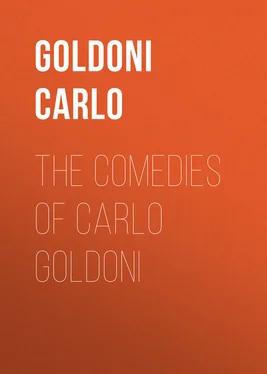Carlo Goldoni - The Comedies of Carlo Goldoni
Здесь есть возможность читать онлайн «Carlo Goldoni - The Comedies of Carlo Goldoni» — ознакомительный отрывок электронной книги совершенно бесплатно, а после прочтения отрывка купить полную версию. В некоторых случаях можно слушать аудио, скачать через торрент в формате fb2 и присутствует краткое содержание. Жанр: foreign_antique, foreign_prose, foreign_dramaturgy, на английском языке. Описание произведения, (предисловие) а так же отзывы посетителей доступны на портале библиотеки ЛибКат.
- Название:The Comedies of Carlo Goldoni
- Автор:
- Жанр:
- Год:неизвестен
- ISBN:нет данных
- Рейтинг книги:5 / 5. Голосов: 1
-
Избранное:Добавить в избранное
- Отзывы:
-
Ваша оценка:
- 100
- 1
- 2
- 3
- 4
- 5
The Comedies of Carlo Goldoni: краткое содержание, описание и аннотация
Предлагаем к чтению аннотацию, описание, краткое содержание или предисловие (зависит от того, что написал сам автор книги «The Comedies of Carlo Goldoni»). Если вы не нашли необходимую информацию о книге — напишите в комментариях, мы постараемся отыскать её.
The Comedies of Carlo Goldoni — читать онлайн ознакомительный отрывок
Ниже представлен текст книги, разбитый по страницам. Система сохранения места последней прочитанной страницы, позволяет с удобством читать онлайн бесплатно книгу «The Comedies of Carlo Goldoni», без необходимости каждый раз заново искать на чём Вы остановились. Поставьте закладку, и сможете в любой момент перейти на страницу, на которой закончили чтение.
Интервал:
Закладка:
Goldoni, during his residence in Paris, had an amusing colloquy with Diderot, who was furious at an accusation made that he had plagiarised from Goldoni in his own play, "Le Père de Famille," – an absurd idea, as there is no resemblance, save in name, between the two. It was from the Larmoyant plays of Diderot and his school, which reflected the false sentimental tone of the day both in France and Germany, that Goldoni had liberated his countrymen, quite as much as from the pseudo-classical plays to which their own land had given birth. Diderot did not perceive this, and in his fury wrote a slashing criticism of all the Italian's plays, stigmatising them as "Farces in three Acts." Goldoni, who, with all his sweetness of temper, was perfectly fearless, simply called on Diderot, and asked him what cause for spite he had against him and his works. Diderot replied that some of his compositions had done him much harm. Duni, an Italian musician, who had introduced them to each other, at this point interposed, saying that they should follow the advice of Tasso, —
"Ogni trista memoria ormai si taccia
E pognansi in oblio le andate cose,"
which may be freely rendered as "Let bygones be bygones." Diderot, who understood Italian well, accepted the suggestion, and the two parted friends. It is an anecdote creditable to all parties, and not least to the two Italians.
It is a pity that Goldoni's Memoirs, from which the above sketch of his life is derived, were written in French instead of Italian, and with regard to a French rather than an Italian public. Had he written in his own language and for his own people, he might have produced a work worthy to rank beside the wondrous tale of Cellini, though of course of a very opposite character. As it is, the narrative is little known, though it has been translated into Italian and issued in cheap form.
Such, briefly, the Italian dramatist, whose best works in substance are the continuation of the ancient plays of Menander and Terence, imitated by the Italians in the sixteenth century, but allowed to degenerate, and then again renovated and carried to perfection by Molière in France and by himself in Italy.
A CURIOUS MISHAP
Philibert, a rich Dutch merchant .
Giannina, his daughter .
Riccardo, a broker .
Costanza, his daughter .
De la Cotterie, a French lieutenant .
Marianna, Mademoiselle Giannina's servant .
Gascoigne, De la Cotterie's servant .
ACT I
Mar. May I wish good-morning to Monsieur Gascoigne?
Gas. Yes, my sweet Marianna, I thank you for your good-morning, but good-night would be more agreeable to me from your lips.
Mar. From what I see, I should rather wish you a pleasant journey.
Gas. Oh, my precious jewel, such a melancholy departure must be followed by a most doleful journey!
Mar. Then you are sorry to go?
Gas. How can you doubt it? After having enjoyed your delightful society for six months, can I leave you without the deepest sorrow?
Mar. And who forces you to do what is so disagreeable?
Gas. Do you not know? My master.
Mar. Masters are not wanting at the Hague, and you can easily find one who will give you better wages than a poor French officer, a prisoner of war, and a man in every way roughly used by fortune.
Gas. Pardon me, such language does not become so good a girl as you are. I have for many years had the honour of serving my excellent master; his father, I may say, recommended me to him; I have attended him in the war, and have not shunned danger to show my fidelity. He is poor, but never man had a better heart. Were he promoted, I am sure I should share his good fortune. Would you desire me to abandon him, and let him return to France without me?
Mar. You speak like the worthy fellow you are; but I cannot conceal my affection for you.
Gas. Dear Marianna, I am as much distressed as you are, but I hope to see you again, and then to be able to say, Here I am, I can support you, and, if you wish it, I am yours.
Mar. Heaven grant it! But why is the Lieutenant in such haste to depart? My master is fond of his company, and I think the daughter not less so than the father.
Gas. Too true; and that is his reason for going.
Mar. What! does he dislike people to be fond of him?
Gas. Ah, my Marianna, my poor master is desperately in love with your young mistress; he leads the most wretched life in the world; he knows their love for each other is increasing every day, and, as they can no longer hide it, he fears for himself, and for Mademoiselle Giannina. Your master is rich, and mine is poor. Monsieur Philibert has this only daughter, and will not give her to a younger son, a soldier; one, in short, who would have to live on her means. The Lieutenant, though poor, is a man of honour; he respects the obligations of hospitality, of friendship, of good faith; he fears he may be overcome and seduced by love, and that he in turn may seduce his mistress from her duty. This being the case, he does violence to his feelings, sacrifices love to principle, and is resolved to go.
Mar. I admire his heroic conduct, but could not imitate it.
Gas. We must exert self-control.
Mar. You can do so more easily than I.
Gas. Indeed, a man's resolution is stronger than a woman's.
Mar. Say rather his affections are weaker.
Gas. So far as regards me, you are wrong.
Mar. I look at acts, not words.
Gas. What can I do to convince you of my love?
Mar. Monsieur Gascoigne does not need me for a teacher.
Gas. Do you wish me to marry you before I go?
Mar. That would, indeed, remove all doubt.
Gas. But then I should have to leave you.
Mar. And could you have the heart to abandon me?
Gas. Oh, you might go with me!
Mar. That would be much better.
Gas. To encounter so many hardships?
Mar. In truth, that would not suit me so well.
Gas. Should I remain here with you, would that satisfy you?
Mar. Perfectly.
Gas. For how long?
Mar. A year at least.
Gas. And after a year, would you let me go?
Mar. Yes, a year after our marriage, if you found it easy to do so.
Gas. I daresay you would let me go after a month.
Mar. I know better.
Gas. I am sure of it.
Mar. Let us try.
Gas. My master is coming; another time we will talk it over.
Mar. Ah, Monsieur Gascoigne, this conversation has unnerved me; do what you please, I trust to you. – [ Aside. ] Indeed, I know not what I say.
[Exit.Gas. If I had not more sense than she, the folly would have been committed before now.
De la Cot. [ To himself. ] Oh, Heaven! how wretched I am! how unfortunate!
Gas. The trunk, sir, is packed.
De la Cot. Ah, Gascoigne! I am in despair.
Gas. Alas! what misfortune has happened?
De la Cot. The worst that could befall me.
Читать дальшеИнтервал:
Закладка:
Похожие книги на «The Comedies of Carlo Goldoni»
Представляем Вашему вниманию похожие книги на «The Comedies of Carlo Goldoni» списком для выбора. Мы отобрали схожую по названию и смыслу литературу в надежде предоставить читателям больше вариантов отыскать новые, интересные, ещё непрочитанные произведения.
Обсуждение, отзывы о книге «The Comedies of Carlo Goldoni» и просто собственные мнения читателей. Оставьте ваши комментарии, напишите, что Вы думаете о произведении, его смысле или главных героях. Укажите что конкретно понравилось, а что нет, и почему Вы так считаете.












